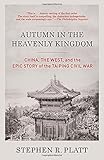Paulo Roberto de Almeida
Today's selection -- from Autumn in the Heavenly Kingdom by Stephen R. Platt. The most widely cited estimate of deaths in China's Taiping Rebellion is 20 million, but more recent scholarship puts that estimate as high as 70 million. The destruction to cities and farms was so pervasive that cannibalism became routine:
"The most widely accepted estimates put the death toll of China's nineteenth-century civil war at somewhere between twenty million and thirty million people. The figure is necessarily impressionistic, for there are no reliable censuses to compare from the time, so it is typically based on demographic projections of what the Chinese population should otherwise have been in later generations. According to one American study published in 1969, by as late as 1913, nearly fifty years after the fall of Nanjing, China's population had yet to recover to its pre-1850 level.
"A more recent study by a team of scholars in China, published in 1999, estimated that the five hardest-hit provinces -- Jiangxi, Hubei, Anhui, Zhejiang, and Jiangsu -- together suffered a population loss of some eighty-seven million people between 1851 and 1864: fifty-seven million of them dead from the war, and the rest never born due to depressed birthrates. Their projection for the full scale of the war in all provinces was seventy million dead, with a total population loss of more than one hundred million. Those higher numbers have recently gained wider circulation, but they are controversial; critics argue that there is no way to know how many of the vanished people died -- from the war, from disease, from starvation -- and how many took up lives elsewhere. Nevertheless, even the most subjective anecdotal reports from travelers on the lower Yangtze testified to the deep scars on China's cities and countryside, which were still far from being healed even decades after the Taiping war, and those figures begin to give a sense of the unprecedented scale of destruction and social dislocation that consumed China in what is believed to be the deadliest civil war in all of human history."
To subscribe, please click here or text "nonfiction" to 22828. |
Autumn in the Heavenly Kingdom: China, the West, and the Epic Story of the Taiping Civil War
Author: Stephen R. Platt
Publisher: Vintage
Copyright 2012 by Stephen R. Platt
Pages: 358-359, 338-339

If you wish to read further: Buy Now
|


Nenhum comentário:
Postar um comentário